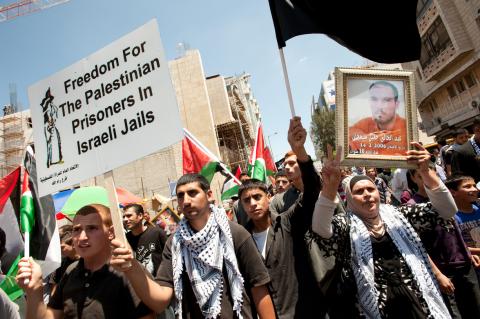
Organizations in the Faith Forum on Middle East Policy send out action alerts monthly, focusing on different issues so that members of Congress hear consistently that their constituents support a just and lasting resolution to the Palestinian and Israeli conflict.
While peacemakers everywhere welcome the ceasefire in Gaza, the underlying issues that led to the war remain. The Israeli occupation of Palestinian land, including the Gaza blockade, must end. And the human rights violations inherent in the occupation must not be allowed to continue unchecked. Keep these concerns before legislators this month, by joining in the World Week for Peace in Palestine Israel, held annually in September and sponsored by the Palestine Israel Ecumenical Forum of the World Council of Churches. This year’s theme is prisoners.
Around 4,800 Palestinians were in Israeli custody as of March 2014, according the Palestinian Centre for Human Rights (PCHR). Palestinians detained by Israel face a host of concerns including the practice of administrative detention, and the treatment of minors.
Administrative detention, as explained by the Israeli human rights organization B’Tselem, “is detention without charge or trial that is authorized by administrative order rather than by judicial decree.” As of the end of July 2014, Israel held 446 Palestinians under administrative detention according to B’Tselem which notes:
Israel's use of administrative detention blatantly violates the restrictions of international law. Israel carries it out in a highly classified manner that denies detainees the possibility of mounting a proper defense. Moreover, the detention has no upper time limit. Over the years, Israel has placed thousands of Palestinians in administrative detention for prolonged periods of time, without trying them, without informing them of the charges against them, and without allowing them or their counsel to examine the evidence. In this way, the military judicial system ignores the right to freedom and due process, the right of defendants to state their case, and the presumption of innocence, all of which are protections clearly enshrined in both Israeli and international law.
The treatment of Palestinian minors by Israel is also of deep concern. A 2013 UNICEF report found, “The ill-treatment of children who come in contact with the military detention system appears to be widespread, systematic and institutionalized…” A review one year later by Military Court Watch acknowledged some attention had been given to UNICEF’s findings, but concluded that the original negative assessment still held.
B’Tselem reports, “At the end of July 2014, 192 Palestinian minors were held in Israeli prisons as security detainees and prisoners. Another 19 Palestinian minors were held in Israel Prison Service facilities for being in Israel illegally.” And they highlight some of the problems facing these Palestinian minors:
- The presence of parents at the interrogation – a right granted to Israeli minors – is not mentioned at all in the relevant military law, and Palestinian minors are often interrogated alone without even having had an opportunity to talk to a lawyer.
- Furthermore, military law has no appropriate rules for the arrest and interrogation of minors.
- In addition, the army typically hauls these minors out of bed in the middle of the night to arrest them, even when the interrogation is not deemed urgent.
- And contrary to Israeli law, which requires that every detainee who is a minor must be brought before a judge within 24 hours – and for those under age 14, within 12 hours – the rules in the territories permit postponement of a minor’s appearance before a judge until the eighth day of his detention, precisely the same as for an adult detainee.
Contact your senators and representative today to raise these concerns. Ask them to bring to the attention of Israeli government officials the issue of Palestinian prisoners in Israeli custody. If they will be traveling to the region soon, ask them to address these concerns in person, otherwise, ask them to contact the Israeli ambassador to the United States.
Furthermore, ask them to speak and act for a just peace by:
- Insisting on an end to the Israeli occupation of Palestinian land, including an end to the Gaza blockade.
- Recognizing that U.S. diplomatic and financial support enables the occupation. The U.S. provides over $3 billion per year in military aid to Israel.
- Conditioning military aid to Israel on its compliance with U.S. law and policy. Questions must be raised about how U.S. military aid to Israel is being used in order to ensure that it is not enabling human rights violations—including prisoners’ rights—or being used in ways that contradict U.S. policy.
For a just and secure future for Palestinians and Israelis, use this link to contact your elected officials today.
